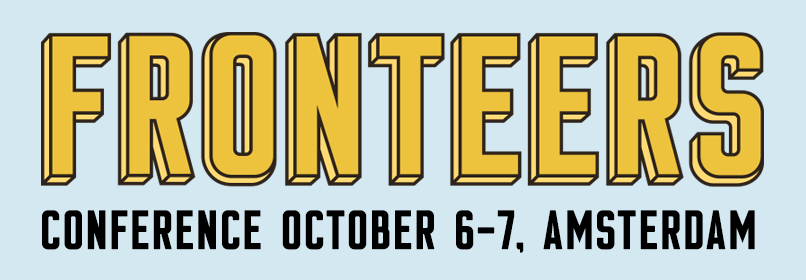Fronteers Conference 2016 Jam Session
| What | Jam Session |
|---|---|
| When | Thursday, October 6th |
| Where | Dam 27, 1012 JS Amsterdam, see the map below |
| Venue | Koninklijke Industrieele Groote Club |
| Open | Jam Session starts at 20:30 |
| Closed | 00:30 |
| Bring | your conference badge |

The Jam Session is Fronteers Conference's annual evening of lightning talks for and from the community: Fronteers stalwarts Koen Willems and Anne van Kesteren curate a list of 10-minute-long, rip-roaring, rabble-rousing, front-ending lightning talks.
This year the Jam Session will take place on Thursday night. We're taking care of a bigger, yet unmistakably Jam Session-y venue, so that the Jams can shine and even more attendees can enjoy them.
Keynote
This years keynote will be given by the autor of the book 'WikiLeaks. Alles wat je niet mocht weten' ('Wikileaks. Everything you were not allowed to know') and reporter and speaker in the area of internet and gadgets. He is co founder of Blendle, a platform with articles of 30 Dutch and German newspapers and magazines. He's a well known guest on Dutch television and ... a very nice person too.
We are so proud to have Alexander Klöpping as our keynote speaker !
Our speakers this year
Front-end news by Paul Verbeek
This talk is a satirical view on the world of front-end developers and the companies we work with.
You & the Big Stage by Roy Tomeij
Wouldn't it cool to be on stage at Fronteers or some other awesome conference? You can! There are things others are dying to learn from you, and organizers are always on the lookout for talent. Here's how to get started and some busted myths.
Preventing timing attacks by Mathias Bynens
Back in April, I gave a scary talk about timing attacks at the very first Fronteers Spring Conference. Since then, a new web technology has emerged that enables developers to prevent timing attacks from targeting their websites.
Level up your living styleguide by Reinier Ladan
A living styleguide is a wonderful thing but you're still copy pasting stuff from the styleguide to your project. You could solve that by generating the styleguide from your project, but what if you have two projects using the same styleguide? Well, here is an answer.
RxGame by Bart Meinders
How my experiences and expertise with Reactive programming (Reactive Extensions, more specific RxJS 4, and then 5..) made me feel confident on taking on my dream of building an open source Progressive WebGL/WebVR game(-engine) (Thee.js).
TBD by Syb Wartna
Why is progressive enhancement needed? Because everything can break. Syb will show you how and why with examples of everyday life. A different take on explaining progressive enhancement, which will help you in communicating with your clients and to make better websites.
Custom Elements: Lightweight alternatives to frameworks by Adam Beres-Deak
In this lightning talk I would like to introduce Custom Elements to the audience. The spec says: "Custom elements provide a way for authors to build their own fully-featured DOM elements. By defining a custom element, authors can inform the parser how to properly construct an element and how elements of that class should react to changes."
They provide a way to define standardized functionality which can be invoked declaratively with the corresponding HTML markup.
Custom Elements are perfect fits for common problems in many areas, e.g. images, icons, tracking and analytics, form input elements, buttons, advertisement and many-many more. They give us code modularization and good testability. Each component can be used and tested in isolation.
Custom Elements are reality now - with a small polyfill they are supported all the way back to IE8. They have native support in Chrome and Firefox.
*Generating Book*s by Vasilis van Gemert
Telling your server to generate books with random rectangles is easy. But generating books with on each page the next step of an animation of 10 overlapping circles that turn into rectangles, of random colour with an exclusion blend mode is a bit harder.
3 Quick accessibility wins for your site by Rian Rietveld
Diving into web accessibility can be overwhelming. Where to start? What is important? Let me give you 3 tips to improve the accessibility of your website and explain you why they work.
5 practical tips to code accessible e-commerce websites by Andrea Verlicchi
We recently did some work to develop accessible e-commerce websites (for the fashion industry). I'd like to share 5 pratical tips that other attendees might not know.
The dangers of CSS frameworks by Belen Albeza
CSS frameworks like Bootstrap or Foundation are very popular nowadays... but they come at a cost. We will see some of the drawbacks of using a framework and why you should consider writing your own CSS.
The worst developer by Jaco Koster
During the past year I have transitioned from Lead Frontend Developer to the position of Architect. In this period I have been talking to all kinds of developers and observed different attitudes from them. And that made me think about all the things that i said and done in the last ten years.
Fun with assistive tech by Job van Achterberg
Examples of two major assistive technologies will be demonstrated with a humorous twist. Followed by mention of inclusive design meetups in Europe and where to attend.
See no evil, hear no evil, feel no evil by Jules Ernst
It will be about a11y. I want the audience give a feeling how inaccessibility feels like by for instance showing a black screen or a video with no sound or disturbed sound.
About Markdown + React by Kristijan Ristovski (Kitze)
The talk is going to explain the following things: writing a markdown editor in React, how to render the markdown syntax as React components, how to customize the outputted React components and how to plug-in custom syntax for rendering custom React components
Everybody Lies by Niels Leenheer
This is talk about browser sniffing. And yes, I do realise it is 2016. I know browser sniffing is ugly and we should all be using feature detection. But a quick search on Github still shows millions of lines of code referring to user agents strings. So this message clearly hasn’t landed yet. But why is browser sniffing a bad choice? This talk will dive into history and show the origin of the user agent string and the hidden battle between browser makers and web developers. It will show its simple beginnings and the horrible monstrosity it has become.
On a Blind Date with React by Leon de Rijke
A look behind the scenes of the interactive documentary Blind Date. Join me on a journey along coding a video player, overcoming animation challenges and incorporating user research feedback. We'll transcode media files, hunt bugs and display translations in the browser along the way. In this talk I'll share the lessons learned in building this client product using React.
